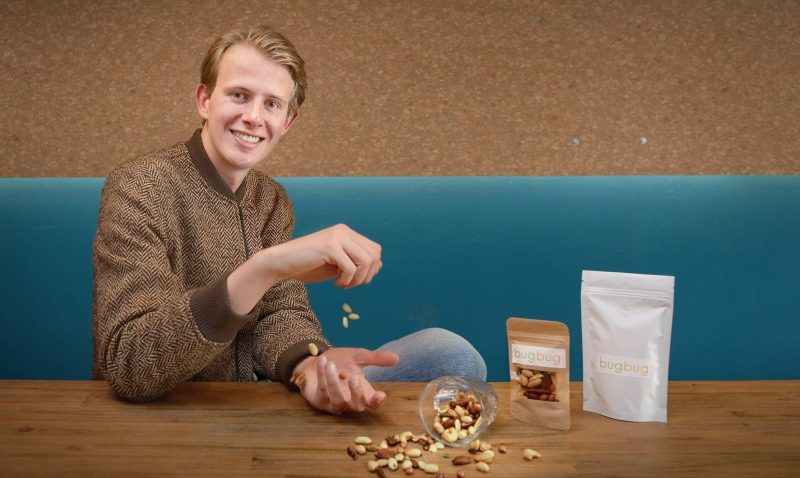Student Peter puts edible insects on the menu.
Bugs as an ingredient in our meals: that is the life mission of world-improver Peter Links. With his company BugBug he sells them to companies who then give them away as a promotional gift. His goal: putting bugs on the menu as a healthy, environmentally friendly and tasty source of protein.
‘Meat was still a luxury product 50 years ago, now it’s our normal protein source. But our earth doesn’t have the capacity to keep up with our meat production.’ Tells the student of marketing management. ‘We are destroying the planet with that. If we want to have a stable living environment in thirty years, we have to change something now.’ One year ago, Peter came in touch with grasshoppers, crickets and mealworms. ‘A friend of mine told me about this and I became curious. Curious about the taste, but also about the challenge to change the mindset around eating bugs using marketing strategies.’ And that is necessary, he concludes. ‘The meat industry has a huge impact on our environment. In order to have a kilo of meat on our plate, we need 5000 litres of water and twenty kilos of food more than for a kilo of bugs on our plate. Besides, the call for meat is increasing around the globe. And we are taking down rainforests to create more ground for cattle feed. In short: we are destroying the world for our BigMac.
From sushi to grasshopper
The first time Peter ate bugs, he was kind of excited. ‘You have no idea what to expect. But bugs have a very neutral, nutty taste to them. You don’t feel like: what is this?’
But how can you get more people to eat worms and grasshoppers? ‘That is my challenge. It is possible. Take sushi for example: cold rice with raw fish. At first, nobody liked the idea. Now it’s very popular.’ Peter’s tactic: putting bugs as a normal part of a snack. ‘I sell a mix of nuts with dried grasshoppers for example. Bugs have a nutty taste of themselves, so that goes together nicely. And when they’re part of a standard snack, it’s less freaky.’
Dream big, act small
He sells these snacks with his company BugBug to organizations who are working on durability and who want to show that in their catering, or by giving a durable promotional gift. Monthly, he gets around seven orders of over a hundred bags. For each order, he’ll work about three hours. ‘I wrap the products myself. In a small professional kitchen I place the labels on the bags and I fill them up. I enjoy how small it is now. Dream big, act small: if I can handle more orders in the future, I will look back on this period with joy.’ Despite the amount of orders coming in, at network events Peter often gets to hear that his concept is not going to work. Comments like: ‘People aren’t going to eat bugs’ are regular comments for Peter. But he is happy with this criticism. ‘Many people who have achieved something big, have had to deal with these kinds of comments. Think about the making of the electrical cars. Car companies saw nothing in this concept. But then Elon Musk introduces Tesla to the market. I think it’s phenomenal to see what he has accomplished in the conservative car industry. It brought the development of electrical cars to a next level.’
Second gear!
Peter is running into that same challenge as musk. ‘I’m not saying that a trail-mix including grasshoppers will change the world, but I am pioneering: I am creating something that does not exist yet.’ Sometimes it can be quite frustrating for Peter that he has no one to see as an example. ‘And around me I see people starting up businesses that grow rapidly. For me it is a much slower journey.’ This is partially because of the laws: the European Food and Drug administration has stopped the market of bugs for human consumption at some point, because there was no policy for it. Now it is tolerated, but new developments are only allowed in the future.’
Because of this policy Peter is being impaired in what he can do. As an entrepreneur he does see the benefits of this. ‘I have time to work on my concept, keep an eye on developments and develop new products in the next few years.’ The making of special taste combinations, like crickets and lavender, is one of his ideas. ‘That’s how you turn a bug into a delicacy. That’s how you take the spotlight away from the ‘freaky’. And if the policy is made in three years? Then there will be a company of which I know exactly where it’s going to go. And then I’ll be able to put this business in second gear!’
